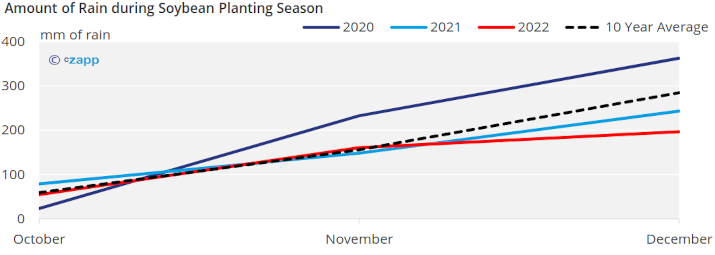Insight Focus
- Drought in Argentina to decrease soybean production.
- Animal feed prices could increase.
- Could this lead to more inflation in Argentina?
Drought in Argentina
Argentina is currently facing a La Niña-induced drought. This is lowering yields and production in the soybean-growing region of the country. In the province of Cordoba, soybean acreage has decreased from 80,000 ha to 12,000 ha due to the drought. Then in Tecnocampo, soybean acreage also reduced from 53,000 ha to 30,000 ha.

Drought Effect on Soybean Production
The current drought has caused farmers to delay soybean planting. Usually, when planting is delayed, the yield falls and so the size of the harvest decreases. As of the first week of December, Farmers have planted 51% of the soybean in the 16.7 million hectares of available land. During this same time last year, farmers had already planted 65% of the land planned. Many estimate the 2022-23 crop production to be between 38m tonnes and 40m tonnes. This figure is similar to the 2018 harvest, which also suffered dry conditions.

Economic Effect of Drought
Soybean is of vast importance to the Argentine economy. Three out of their top five exports are products consisting of soybeans.

The drought could create a soybean shortage since Argentina is the world’s third-largest producer. China and Egypt (Argentina’s two largest soybean importers) will have to look elsewhere for soybean.


Another product that will be affected due to the drought is soybean meal. Soybean meal is Argentina’s largest export. Argentina is also the fourth largest exporter in the world of soybean meal.

This could increase global animal feed prices.
Drought’s other Effects
In November, Argentina started a “soy dollar” to increase its low reserves of dollars. Argentina would sell its soybeans at 230 pesos per dollar instead of the standard conversion of 165 pesos per dollar. The policy aimed to increase to strengthen the local currency and help combat inflation. If Argentina’s soybean exports decrease this year due to the drought, it can lead to even more significant economic damage than expected.














